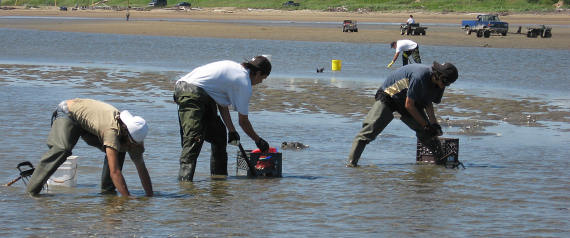They're normally found in face wash, shower gel and toothpaste. But plastic microbeads are now showing up in lakes and rivers.
A team of researchers from McGill University and the Quebec government have discovered these microbeads — often marketed by the cosmetic industry as a way to feel extra clean — at the bottom of the St. Lawrence River.
"The more we looked, the more we found. That was definitely really worrisome," said Suncica Avlijas, a graduate student at McGill University.
Microplastics are a global contaminant in the world’s oceans, but this is the first time they been detected in fresh water.
Researchers collected sediment from ten locations along a 320-kilometre section of the river from Lake St. Francis to Quebec City.
Microbeads were sieved from the sediment, and then sorted and counted under a microscope.
At some locations, the researchers measured over 1,000 microbeads per litre of sediment, a magnitude that rivals the world’s most contaminated ocean sediments.
"I was surprised because they're buoyant, they're small, they've only been reported as floating," said Anthony Ricciardi, a McGill University associate professor and biologist.
Ricciardi is worried the small plastic beads will end up in the food chain. Scientists say toxins like PCBs can latch onto microbeads which then get eaten by fish.
McGill researchers are dissecting some fish that feed on the riverbed, looking for microplastics inside.
"If they build up in large enough numbers, as they appear to be, they can more easily enter the food chain," Ricciardi said.
Legislation wanted
Illinois recently became the first U.S. state to ban the sale of cosmetics containing microbeads.
Quebec's Green Party wants the province to follow suit.
"What we hope is that if a couple of states or jurisdisctions in North America ban the sale of microbeads then the manufacturers will extend that ban to all their products simply to have uniform distribution," said Alex Tyrrell, leader of the Green Party of Quebec.
Cosmetics companies such as L'Oréal and Johnson & Johnson are pledging to phase out microbeads from their products within the next three years.
"Our ability to detect things in our environment has just increased exponentially in the last number of years. This kind of science has now come to light and the appropriate steps are going to be taken to make sure they're eliminated," said Darren Praznik, president and CEO of the Canadian Cosmetic, Toiletry and Fragrance Association.
Original Article
Source: huffingtonpost.ca/
Author: cbc
A team of researchers from McGill University and the Quebec government have discovered these microbeads — often marketed by the cosmetic industry as a way to feel extra clean — at the bottom of the St. Lawrence River.
"The more we looked, the more we found. That was definitely really worrisome," said Suncica Avlijas, a graduate student at McGill University.
Microplastics are a global contaminant in the world’s oceans, but this is the first time they been detected in fresh water.
Researchers collected sediment from ten locations along a 320-kilometre section of the river from Lake St. Francis to Quebec City.
Microbeads were sieved from the sediment, and then sorted and counted under a microscope.
At some locations, the researchers measured over 1,000 microbeads per litre of sediment, a magnitude that rivals the world’s most contaminated ocean sediments.
"I was surprised because they're buoyant, they're small, they've only been reported as floating," said Anthony Ricciardi, a McGill University associate professor and biologist.
Ricciardi is worried the small plastic beads will end up in the food chain. Scientists say toxins like PCBs can latch onto microbeads which then get eaten by fish.
McGill researchers are dissecting some fish that feed on the riverbed, looking for microplastics inside.
"If they build up in large enough numbers, as they appear to be, they can more easily enter the food chain," Ricciardi said.
Legislation wanted
Illinois recently became the first U.S. state to ban the sale of cosmetics containing microbeads.
Quebec's Green Party wants the province to follow suit.
"What we hope is that if a couple of states or jurisdisctions in North America ban the sale of microbeads then the manufacturers will extend that ban to all their products simply to have uniform distribution," said Alex Tyrrell, leader of the Green Party of Quebec.
Cosmetics companies such as L'Oréal and Johnson & Johnson are pledging to phase out microbeads from their products within the next three years.
"Our ability to detect things in our environment has just increased exponentially in the last number of years. This kind of science has now come to light and the appropriate steps are going to be taken to make sure they're eliminated," said Darren Praznik, president and CEO of the Canadian Cosmetic, Toiletry and Fragrance Association.
Original Article
Source: huffingtonpost.ca/
Author: cbc

No comments:
Post a Comment